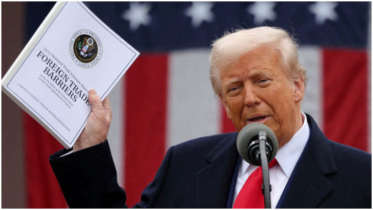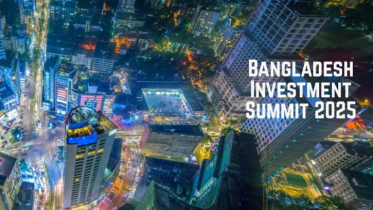Bangladesh's economy is collapsing, you say?

There have been many rumours flying about lately, such as “Bangladesh is destined to be the next Sri Lanka,” or “there is no money in the banks,” or “every government institution has become a vacuum,” and so on. The fact that laypeople are behaving based on these reports has heightened market stress as depositors are withdrawing their funds, businesses are scaling back operations, and price increases and excessive inflation are being witnessed.
The market as a whole feels uneasy, yet hardly anyone has asked if there is any truth to these statements, and, if so, what can we do as responsible citizens to protect our interests? Information must be verified, and the relationship between rumours and beneficiaries must be examined in order to determine the solution.
With a GDP growth rate of 6.2% in 2021, everyone could see how quickly Bangladesh was recovering from the shock of Covid-19. “Despite the uncertainty created by Covid-19, the outlook for Bangladesh's economy is positive. Much of the pace of recovery will depend on how fast mass vaccination can be achieved,” said Mercy Miyang Tembon, the World Bank Country Director for Bangladesh and Bhutan. However, before the world could completely recover from the shock of the pandemic, the Russia-Ukraine war broke out, causing global inflation and damaging the world economy on an unprecedented scale.
With every crisis, a coterie of individuals benefit. So, unsurprisingly, a notable group of individuals has profited from the circumstance. Reduced fuel supplies, insufficient energy output, fluctuating foreign exchange rates, etc. have given the group a foundation from which to spread misinformation. In addition, when Bangladesh Bank sought budgetary assistance from the IMF to reduce pressure on their balance of payment, speculations about Bangladesh's lack of foreign reserves and banks' inability to pay their check obligations and an impending default came to the fore of the heated public debate. A wide range of people began to simply make up information, which further heightened the tension among the populace.
The tension among market participants made them sell their stocks, which caused the stock market to tumble. They also started taking their money out of the bank and cashing out premature fixed deposits, along with other things. The participants' response ultimately raised the fund's cost.
The peoples' response suggested that individuals who created the fear had achieved some kind of success. For instance, despite Bangladesh being the world's third-largest producer of rice -- producing 3,58,50,000 metric tons -- as well as vegetables and fish, people still believed Bangladesh was at a significant risk of food insecurity. Such a response turned out to be "the golden goose" for some.
These individuals may be a part of vested groups who have their own motive and interest to serve by exploiting public fear regarding the economy. The syndicate is raising product prices with ulterior motives and recording abnormal profits in their daily journal at the expense of the general public. Additionally, private companies are expanding the amount of assets on their balance sheets by realizing currency exchange rate changes, boosting their interest rates on loans, and supporting or taking part in tax evasion at the expense of the economy.
How we can protect ourselves from these campaigns
It is important to address our mistakes first. In the stock market, individual investors often listen to any negative information and begin selling their shares. When the security market is under sell pressure, the price falls immediately. They consistently overlook the chance to make an investment and behave differently than the graduates of the market.
A finance or economics graduate, for instance, might decide to put his money in a company with a higher intrinsic value and a lower share price or in an economy that is currently in a trough but has the potential to soon reach a peak. But regular investors often do the opposite.
Now that the country's economic boom is either being slowed down or being pushed towards recession by the aforementioned rumours, anyone can easily make a little additional cash by leveraging these rumours and following the approach a graduate will take.
As most people of our country are risk averse, the most suitable option for them is National Savings Certificates (NSC) otherwise known as sanchayapatra. The interest rate on the NSCs issued by Bangladesh Bank is 11% to 13%, which is significantly higher than the interest rate on bank deposits. The rate, which is dependent on maturity time, not only counteracts inflation but also offers a steady income. No other bank offers a higher value than NSCs. However, this is not the only rationale behind stating the savings certificate as the best option. Availability and risk are also two crucial factors behind the statement.
The nation had a goal of selling Tk35,000 crore worth of NSCs during the fiscal year that will conclude in June 2023. However, as of November 2022, only Tk1,610cr of NSCs had been sold. Anyone looking to invest in a risk-free instrument should take note of this green light as it indicates a huge amount of NSCs is available.
From another perspective, even if the rumours are true, the NSC still could be the best instrument to be added to an investor's portfolio.
First, it is unwise to hold too much cash as it would just decrease the purchasing power because the value of money over time always decreases. Second, Bangladesh is gaining popularity as the most suitable investment basket in Southeast Asia because of its rapid growth. Bangladesh's economy is currently the 35th largest due to expanded food production capacity, the opening of major projects, and improved connectivity.
Thus, Bangladesh is, without a doubt, the ideal destination for FDIs as well as for domestic investments. In today's context, in order to inoculate oneself from the rumours and other economic shocks, the strategy to hold NSC is still unparalleled .
Source: Dhaka Tribune
.png)




